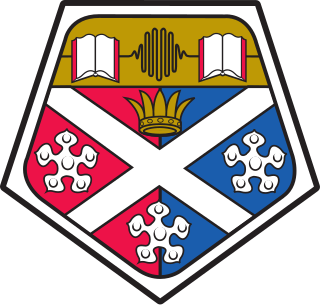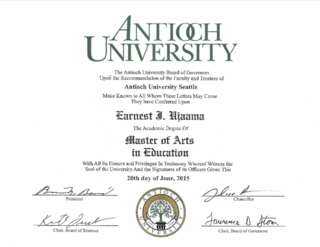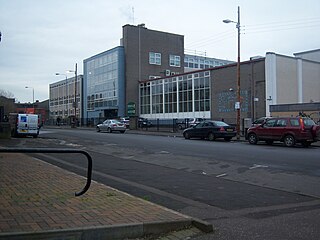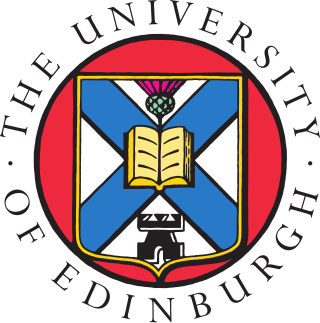Related Research Articles
Citizenship is the enjoyment by a natural person of civil and political rights of a polity, as well as the incurring of duties, which are not afforded to non-citizens.

A school is both the educational institution and building designed to provide learning spaces and learning environments for the teaching of students under the direction of teachers. Most countries have systems of formal education, which is sometimes compulsory. In these systems, students progress through a series of schools that can be built and operated by both government and private organization. The names for these schools vary by country but generally include primary school for young children and secondary school for teenagers who have completed primary education. An institution where higher education is taught is commonly called a university college or university.

Scottish Gaelic, also known as Scots Gaelic or simply Gaelic, is a Goidelic language native to the Gaels of Scotland. As a Goidelic language, Scottish Gaelic, as well as both Irish and Manx, developed out of Old Irish. It became a distinct spoken language sometime in the 13th century in the Middle Irish period, although a common literary language was shared by the Gaels of both Ireland and Scotland until well into the 17th century. Most of modern Scotland was once Gaelic-speaking, as evidenced especially by Gaelic-language place names.

Home economics, also called domestic science or family and consumer sciences, is a subject concerning human development, personal and family finances, consumer issues, housing and interior design, nutrition and food preparation, as well as textiles and apparel. Much less common today, it was, and is, most commonly taught in secondary school or high school.

A master's degree is a postgraduate academic degree awarded by universities or colleges upon completion of a course of study demonstrating mastery or a high-order overview of a specific field of study or area of professional practice. A master's degree normally requires previous study at the bachelor's level, either as a separate degree or as part of an integrated course. Within the area studied, master's graduates are expected to possess advanced knowledge of a specialized body of theoretical and applied topics; high order skills in analysis, critical evaluation, or professional application; and the ability to solve complex problems and think rigorously and independently.

The University of Strathclyde is a public research university located in Glasgow, Scotland. Founded in 1796 as the Andersonian Institute, it is Glasgow's second-oldest university, having received its royal charter in 1964 as the first technological university in the United Kingdom. Taking its name from the historic Kingdom of Strathclyde, it is Scotland's third-largest university by number of students, with students and staff from over 100 countries.
Education in Scotland is provided in state schools, private schools and by individuals through homeschooling. Mandatory education in Scotland begins for children in Primary 1 (P1) at primary school and ends in Fourth Year (S4) at secondary school. Overall accountability and control of state–education in Scotland rests with the Scottish Government, and is overseen by its executive agency, Education Scotland, with additional responsibility for nursery schools being the joint responsibility of both Education Scotland and the Care Inspectorate. Scotland's private schools are overseen by the Scottish Council of Independent Schools. Children in Scotland sit mandatory National Standardised Assessments in Primary 1 (P1), Primary 4 (P4), Primary 7 (P7) at the end of primary school, and Third Year (S3) in secondary school, which assist in monitoring children's progress and providing diagnostic data information to support teachers' professional judgement.
The British undergraduate degree classification system is a grading structure for undergraduate degrees or bachelor's degrees and integrated master's degrees in the United Kingdom. The system has been applied in other countries and regions.

Edinburgh Napier University is a public university in Edinburgh, Scotland. Napier Technical College, the predecessor of the university, was founded in 1964, taking its name from 16th-century Scottish mathematician and philosopher John Napier. The technical college was inaugurated as a university in 1992 by Lord Douglas-Hamilton, becoming Napier University. In 2009, the university was renamed Edinburgh Napier University.

The University of the Highlands and Islands (UHI) is an integrated, tertiary institution encompassing both further and higher education. It is composed of 12 colleges and research institutions spread around the Highlands and Islands, Moray and Perthshire regions of Scotland. UHI offers further education, undergraduate, postgraduate and research programmes which can be studied at a range of locations across the area and online. It has 31,000 students, including 19,779 further education students and 11,210 higher education students.
Physics education or physics teaching refers to the education methods currently used to teach physics. The occupation is called physics educator or physics teacher. Physics education research refers to an area of pedagogical research that seeks to improve those methods. Historically, physics has been taught at the high school and college level primarily by the lecture method together with laboratory exercises aimed at verifying concepts taught in the lectures. These concepts are better understood when lectures are accompanied with demonstration, hand-on experiments, and questions that require students to ponder what will happen in an experiment and why. Students who participate in active learning for example with hands-on experiments learn through self-discovery. By trial and error they learn to change their preconceptions about phenomena in physics and discover the underlying concepts. Physics education is part of the broader area of science education.

A Master of Arts is the holder of a master's degree awarded by universities in many countries. The degree is usually contrasted with that of Master of Science. Those admitted to the degree have typically studied subjects within the scope of the humanities and social sciences, such as history, literature, languages, linguistics, public administration, political science, communication studies, law or diplomacy; however, different universities have different conventions and may also offer the degree for fields typically considered within the natural sciences and mathematics. The degree can be conferred in respect of completing courses and passing examinations, research, or a combination of the two.
The modern division of philosophy into theoretical philosophy and practical philosophy has its origin in Aristotle's categories of natural philosophy and moral philosophy. The one has theory for its object, and the other practice.

The A-level is a subject-based qualification conferred as part of the General Certificate of Education, as well as a school leaving qualification offered by the educational bodies in the United Kingdom and the educational authorities of British Crown dependencies to students completing secondary or pre-university education. They were introduced in England and Wales in 1951 to replace the Higher School Certificate. The A-level permits students to have potential access to a chosen university they applied to with UCAS points. They could be accepted into it should they meet the requirements of the university.

Jennifer "Jenny" Wormald HonFSA Scot was a Scottish historian who studied late medieval and early modern Scotland.

Scottish Gaelic-medium education, also known as Gaelic-medium education (GME), is a form of education in Scotland that allows pupils to be taught primarily through the medium of Scottish Gaelic, with English being taught as the secondary language.
The General Certificate of Education (GCE) Advanced Level, or A Level, is a main school leaving qualification in England, Wales, Northern Ireland, the Channel Islands and the Isle of Man. It is available as an alternative qualification in other countries.

The University of Edinburgh is a public research university based in Edinburgh, Scotland. Founded by the town council under the authority of a royal charter of King James VI in 1582 and officially opened in 1583, it is one of Scotland's four ancient universities and the sixth-oldest university in continuous operation in the English-speaking world. The university played an important role in Edinburgh becoming a chief intellectual centre during the Scottish Enlightenment and contributed to the city being nicknamed the "Athens of the North."

Jennifer Madeleine Gilruth is a Scottish politician who has served as the Cabinet Secretary for Education and Skills since 2023. A member of the Scottish National Party (SNP), she has been the Member of the Scottish Parliament (MSP) for Mid Fife and Glenrothes since 2016.

The Faculty of History is one of the constituent departments of the University of Cambridge.
References
- 1 2 "Modern Studies - SQA". Scottish Qualifications Authority . Retrieved 14 February 2021.
- ↑ "Modern Studies - BBC Bitesize". British Broadcasting Corporation . Retrieved 14 February 2021.
- 1 2 Maitles, Henry (20 September 2000). Political Education in Scotland: an assessment of effectiveness. European Conference on Educational Research. Retrieved 8 July 2023.